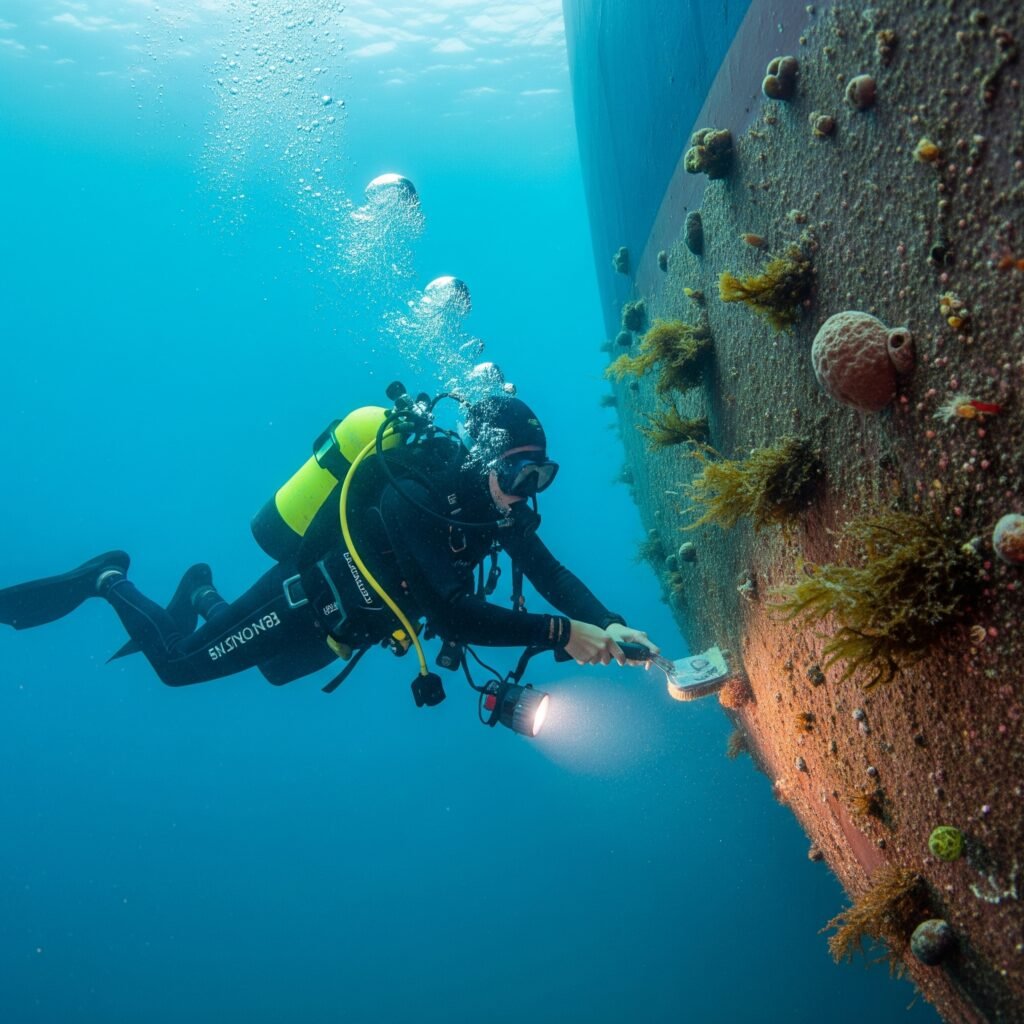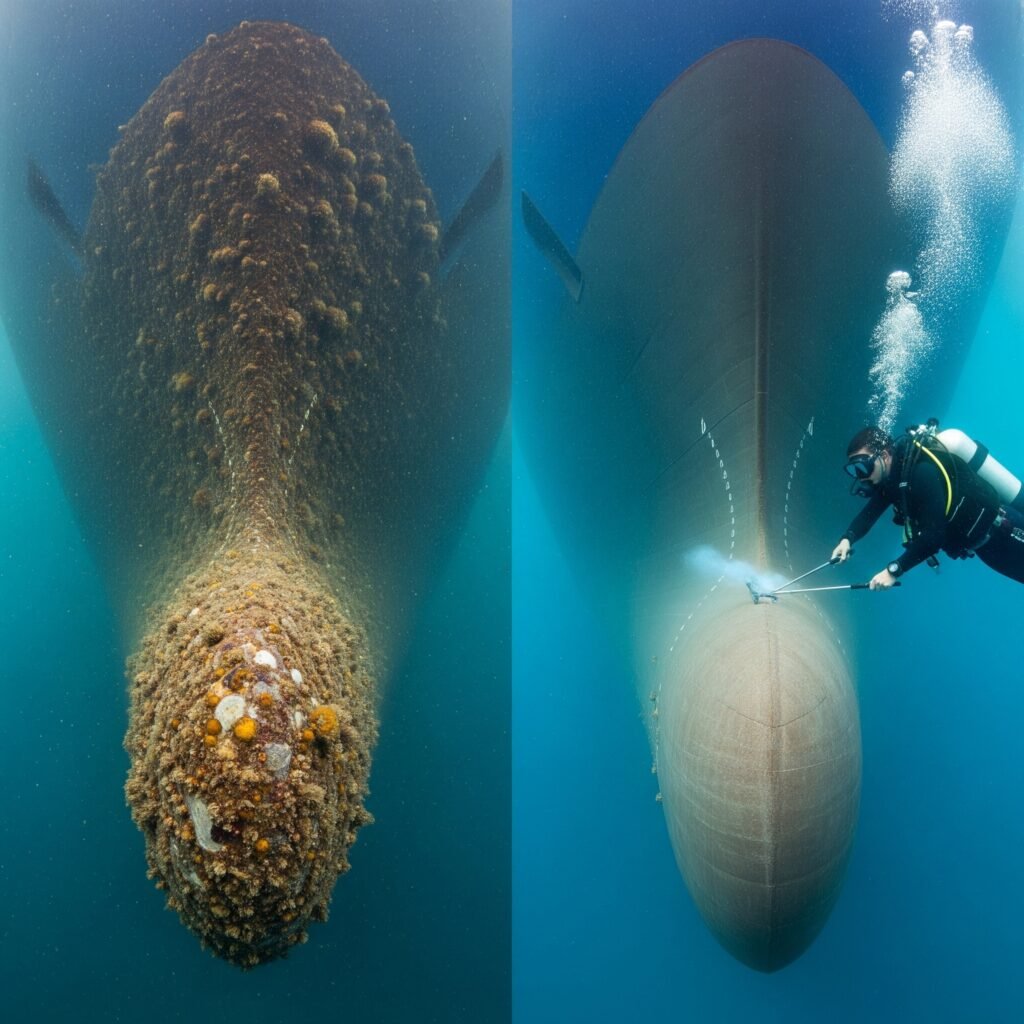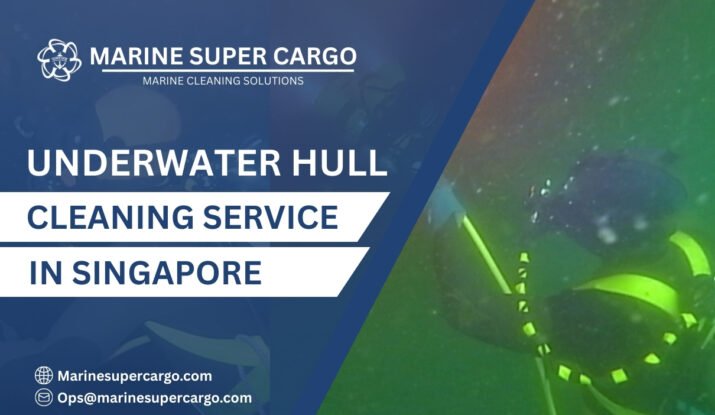Singapore, one of the world’s busiest maritime hubs, sees thousands of vessels daily, making vessel maintenance vital. Among essential upkeep tasks, underwater hull cleaning is often overlooked yet crucial. It improves fuel efficiency, extends vessel lifespan, and ensures compliance with environmental regulations. In Singapore’s unique marine environment, effective hull cleaning addresses biofouling challenges while supporting sustainable operations. This guide covers the basics of hull cleaning, key benefits, popular methods, costs, legal requirements, and preventive strategies to help vessel owners maintain cleaner, more efficient ships for longer periods.
Understanding Underwater Ship Hull Cleaning in Singapore
Underwater hull cleaning removes marine growth, or biofouling, such as barnacles, algae, and seaweed, from a vessel’s submerged surfaces. This growth increases drag, slows the vessel, and raises fuel consumption. Unlike dry-docking, which is costly and time-consuming, cleaning is performed while the ship remains afloat, ensuring faster turnaround and minimal downtime. In Singapore’s busy port, this method is essential for maintaining efficiency, reducing operational costs, and keeping vessels in optimal condition without disrupting schedules.

Why Underwater Ship Hull Cleaning in Singapore Is Vital
Singapore’s tropical waters create an ideal environment for marine life to thrive, causing vessels to accumulate biofouling at a much faster rate than in colder regions. The significance of hull cleaning in Singapore cannot be overstated, as neglecting this maintenance task can lead to serious operational, financial, and environmental consequences.
Enhanced Fuel Efficiency and Reduced Emissions
Even a thin layer of biofouling can reduce a vessel’s speed by up to 10%. Consequently, vessels consume up to 30% more fuel to maintain their cruising speed. This increased fuel burn raises operational costs and contributes substantially to greenhouse gas emissions. Given Singapore’s strong commitment to sustainable maritime practices, regular underwater ship hull cleaning in Singapore—especially when carried out by trusted providers like CleanShip.co—directly supports environmental goals by lowering fuel consumption and carbon emissions.
Improved Vessel Performance and Engine Longevity
A fouled hull creates additional water resistance, forcing engines to work harder. This overexertion accelerates engine wear and increases the frequency and cost of repairs. Clean hulls reduce drag, allowing engines to operate more efficiently, prolong their lifespan, and enhance the vessel’s overall performance.
Prevention of Hull Corrosion and Structural Damage
Marine organisms can bore into the hull’s protective coatings. Once these coatings are compromised, saltwater accelerates corrosion on the metal hull beneath. Over time, this weakens the vessel’s structural integrity, potentially leading to expensive repairs or even endangering vessel safety.
Compliance with Environmental and Biosecurity Laws
Singapore enforces strict biosecurity laws to prevent the spread of invasive marine species. Biofouling can transport these harmful species across regions, threatening local ecosystems. The Maritime and Port Authority of Singapore (MPA) mandates that vessels maintain clean hulls to mitigate ecological risks. Failure to comply can result in fines, vessel detention, or loss of operating licenses.
Diver-Based Manual Underwater Ship Hull Cleaning in Singapore
Highly trained divers perform manual cleaning using tools such as brushes, scrapers, and rotary machines. This method is highly effective for small to medium-sized vessels and allows for precision cleaning, especially in sensitive or hard-to-reach areas.
Ultra-High Pressure Water Jetting
This technique employs pressurized water jets to dislodge biofouling without damaging antifouling coatings. The method is eco-friendly, avoids chemical contamination, and is highly effective at removing stubborn growth. Singapore’s maritime regulations favor such green technologies.
Eco-Friendly Brush Cart Systems
These systems are magnetically attached to the hull and use soft brushes along with biodegradable cleaning agents. This approach cleans efficiently without contaminating local waters, supporting Singapore’s commitment to marine conservation.
Choosing a Professional Service of Underwater Ship Hull Cleaning in Singapore
Selecting the right cleaning provider is crucial. Here are the key factors to consider:
Experience and Technological Capability
Choose providers with extensive experience servicing different vessel types. Advanced technology, such as robotic cleaners and underwater cameras, can enhance cleaning quality and safety.
Environmental Responsibility
The provider should use biodegradable cleaning agents and prevent the spread of invasive species. Eco-conscious cleaning aligns with Singapore’s environmental policies.
Comprehensive Documentation
Professional companies offer detailed pre- and post-cleaning inspection reports, photographic evidence, and fouling analysis. Such documentation supports regulatory compliance and maintenance records.
Legal and Environmental Framework Governing Underwater Ship Hull Cleaning in Singapore
Singapore’s commitment to marine protection is reflected in rigorous laws governing hull cleaning:
- Prevention of Pollution of the Sea Act (PPSA): Prohibits discharges that harm marine environments.
- International Maritime Organization (IMO) Biofouling Guidelines: Set global standards to control biofouling risks.
- Maritime and Port Authority’s Hull Cleaning Regulations: Enforce strict cleaning protocols to prevent invasive species transfer.
Non-compliance risks hefty fines, vessel detention, and operational disruptions. Engaging certified professionals ensures adherence to these regulations.
Preventive Strategies to Minimize Biofouling
Adopting proactive measures helps extend the period between hull cleanings:
- Advanced Antifouling Coatings: Silicone and copper-based paints reduce marine growth adherence.
- Regular Inspections: Periodic underwater checks detect fouling early, preventing heavy accumulation.
- Avoid Prolonged Stays in Shallow Waters: Shallow and stagnant waters encourage rapid biofouling.
- Ultrasonic Antifouling Devices: These emit sound waves that deter marine organisms from settling.
Such strategies optimize vessel maintenance costs and operational efficiency.
Environmental Impact and Sustainability
Underwater ship hull cleaning in Singapore is a cornerstone of sustainable maritime practices. It lowers greenhouse gas emissions by improving fuel efficiency and reduces the spread of invasive species that can disrupt marine ecosystems. Singapore’s maritime industry actively promotes eco-friendly hull cleaning methods to protect its rich marine biodiversity. Drawing from global port initiatives like those highlighted at Durres Port, Singapore continues to integrate innovative, responsible cleaning practices that balance operational needs with environmental stewardship.

The Future of Underwater Ship Hull Cleaning in Singapore
Technological advancements are driving the future of underwater ship hull cleaning in Singapore. Innovations like AI-powered robots, real-time monitoring systems, and eco-friendly cleaning agents are becoming industry standards. Singapore’s maritime sector is at the forefront of adopting these technologies, combining efficiency with environmental stewardship. By aligning with global best practices from organizations such as the International Marine Contractors Association (IMCA) and the International Association of Ports and Harbors (IAPH), Singapore ensures its leadership in safe, sustainable, and forward-looking maritime operations.
Conclusion
Underwater ship hull cleaning in Singapore is vital for efficiency, cost savings, compliance, and environmental care. Regular cleaning improves performance, extends vessel life, and aligns with Singapore’s sustainability goals. Vessel owners should opt for professional, eco-friendly services to ensure safety, quality, and regulatory adherence. Certified providers deliver effective cleaning that protects both ships and marine ecosystems. By keeping hulls clean, operators can navigate global trade with confidence, reduce fuel use, and maintain peak operational standards while safeguarding the environment.
FAQ:
1. What is underwater ship hull cleaning in Singapore, and why is it necessary?
Underwater hull cleaning is the process of removing marine growth like algae, barnacles, and slime from a ship’s hull while it remains in the water. It is essential for improving fuel efficiency, vessel speed, and preventing damage caused by biofouling.
2. How often should hull cleaning be done in Singapore?
The frequency depends on the vessel type, operating environment, and antifouling systems used. In Singapore’s warm waters, cleaning is typically recommended every 3 to 6 months to maintain optimal performance.
3. Is underwater hull cleaning allowed in Singapore?
Yes, but it must comply with the regulations set by the Maritime and Port Authority of Singapore (MPA). Only approved service providers using eco-friendly methods are permitted to perform hull cleaning in designated areas.
4. What methods are used for underwater ship hull cleaning in Singapore?
Common methods include diver-based cleaning using hand tools or brushes and robotic systems that use water jets, brushes, or cavitation technology. Some providers also offer non-intrusive ultrasonic cleaning options.
5. Can hull cleaning be done while the vessel is in operation?
Hull cleaning typically requires the vessel to be stationary, often performed at anchor, in port, or special cleaning zones. Mobile hull cleaning robots, however, allow for cleaning with minimal downtime, making it more efficient for commercial operators.


